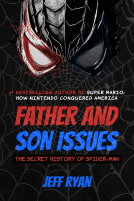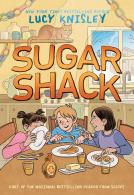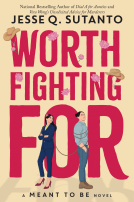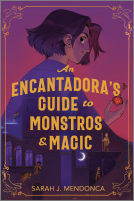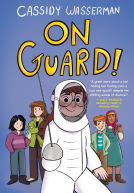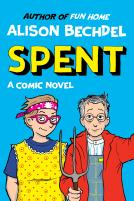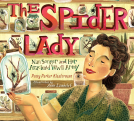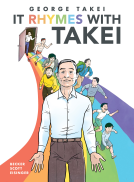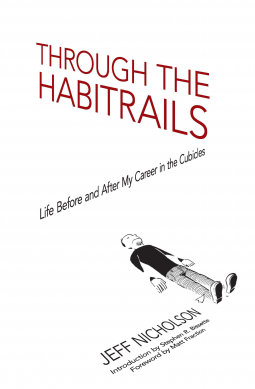
Through the Habitrails
Life Before and After My Career in the Cubicles
by Jeff Nicholson
This title was previously available on NetGalley and is now archived.
Send NetGalley books directly to your Kindle or Kindle app
1
To read on a Kindle or Kindle app, please add kindle@netgalley.com as an approved email address to receive files in your Amazon account. Click here for step-by-step instructions.
2
Also find your Kindle email address within your Amazon account, and enter it here.
Pub Date Mar 15 2016 | Archive Date May 17 2016
Description
This collection of darkly humorous tales chronicles a nameless protagonist's struggle with a stultifying routine of office drudgery. The stories' Kafkaesque vignettes, portrayed in striking black-and-white drawings, offer eerie perspectives on the rigors of everyday life.
Author Jeff Nicholson is best known as the creator of Ultra Klutz, Lost Laughter, Father & Son, and Colonia. Praised by comics artist and publisher Stephen R. Bissette as "one of the seminal graphic novels of the 1990s," Through the Habitrails features semi-autobiographical vignettes that include "Futile Love," "The Doomed One," "The Infiltrator," "The Dark Spiral," "The Gerbil King," and the "Escape" trilogy, one part of which was a 1993 Eisner Award nominee.
Exclusive Bonus Material contains a new Epilogue, written and illustrated by the author, and a new Foreword by multiple Eisner Award winner Matt Fraction.
Available Editions
| EDITION | Paperback |
| ISBN | 9780486802862 |
| PRICE | $14.95 (USD) |
Average rating from 17 members
Featured Reviews
 Paul M, Reviewer
Paul M, Reviewer
Jeff Nicholson says Through the Habitrails: Life Before and After My Career in the Cubicles really isn't autobiographical. All the better for him. His graphic novel, published serially and intermittently through the 1990s, presents a creepy, bleak, and dehumanizing picture of corporate life.
Our protagonist slaves in his cubicle creating content, while the gerbils, who somehow run the place, run around in their habitrails. People sneak up behind him and slap on tap on his head to sap his creative juices. In one of the more depressing-sounding expressions of an attitude shared by employees everywhere, Nicholson writes: "The company won two-thirds of my life, and drained the juices from my driven flesh for its own needless product."
This sense of alienation from work, or rather from the fruits of one's labor, permeates Through the Habitrails. Nicholson's office worker labors on, yet seeks means of escape, both literal and through food, entertainment, drugs, and drink. The last is most memorable, in the form of a jar he encases his entire head in a keeps filled with beer. Yes, it's as weird as it sounds.
This new re-issue includes an introduction by Stephen Bissette, who published Through the Habitrails in Taboo magazine, a comics anthology that specialized in horror and other edgy comics. He rightly points out that Nicholson's work is a sort of mix of Kafka and Dilbert, although it's much more subversive and disturbing than Dilbert. The tone is certainly Kafkaesque. (Bissette bemoans the fact that "Kafkaesque" is used by people who have never read Kafka or know who he is. But he never makes clear whether Nicholson himself read or was influenced by Kafka. I'm curious whether or not this is the case.)
I was struck with thought, where are the positive, affirming depictions of labor, of business, of making a living in a traditional job? Comics and other entertainment on this theme (think Office Space and The Office) draw on the perpetual, perceived struggle of labor versus management. I guess people who are not disgruntled don't write comics. It's just that many companies are great and make fantastic contributions to humanity. Many employees of big companies are content or even enthused about the role they play in something bigger than themselves. We simply don't see that state of things portrayed in comics, movies, or fiction very often.
Through the Habitrails is an entertaining collection of weirdness that is probably more relevant today than it was in the early 1990s, when it appeared in Taboo. Too bad Nicholson is not writing comics today.
Thanks to NetGalley and the publisher for the complimentary electronic review copy!
If you were expecting to read something happy or comical, then you’re looking in the wrong place. This graphic novel is humorous in the darkest way, and may appeal to some and horrify others.
Through the Habitrails starts with an incredibly long introduction, a 13 page introduction by Stephen R. Bisette. Admittedly, I wanted to get through this before starting the actual content, to see if it could offer me some background about Habitrails, give me something a little extra, but I got about three pages in before I grew impatient. I wanted to read Nicholson's words, so I skipped it and went back to read it after I had finished.
This graphic novel is bleak, incredibly so. The black and white illustrations only add to the melancholic journey you take whilst reading. However although it’s bleak for the protagonist, it might also make you consider how good you may have things.
Sure, it's bad working conditions and a miserable life taken to the extreme (the humorous satirical nature is apparent, especially with the pickle jar filled with beer), but is it? Every reader will find something to relate to whilst reading this, and will feel at least an ounce of despair for the protagonist. I’m sure, like the unnamed protagonist, everyone has wanted to escape, or hasn’t identified with their peers before.
Even though some of the imagery in this graphic novel (the illustrated, and that imagined from the writing) can be harrowing, Through the Habitrails is indeed compelling. I won't lie though, it was hard for me to get through and left me questioning a lot of things about the meaning of adulthood. Maybe because I'm younger than the protagonist and haven't had his experiences than I'm less jaded than him. The monotony of the protagonist's life, and how uses increasingly harmful ways (and how Nicholson uses increasingly fantastical methods) to cope with the mediocrity and stagnancy of his life are equal parts funny and disturbing. He’s definitely desperate for escape from his life though.
Sometimes I too felt like the protagonist, as if I was reading this from outside my own body. I had to stop, go and do something else for five minutes, and then return to reading this in order to get through it. If you have depression, or have had harmful thoughts then I would probably advise against reading this. It isn’t all doom and gloom though, and we find the protagonist finally at some sort of peace at the end of Habitrails, and I too feel more at peace than I did at the start of the graphic novel. This truly is a testament to the work-life balance, albeit slightly more fantastical than most people portray theirs.
Yes, this graphic novel can be enjoyable, and over 20 years after it was published it still rings true, however it is also incredibly creepy. Not everyone will get it, but that’s okay.
 Jim M, Reviewer
Jim M, Reviewer
”I often compare the act of storytelling to that process of playing cards, specifically certain poker strategies. When do you show which card? Why? What card do you keep close to your best?”
I love this analogy!
I think I would describe this as more horrific than horror as the introduction suggests.
But, damn! You get that feeling of creepiness, emptiness, and loss from page 1!
You can relate to a lot of this. Living for someone else who (literally!) taps the creative juices from you for nefarious purposes.
The misogyny kind of smacks you in the face - but then you realize it's supposed to - that it's part of the life he leads but shouldn't. "She would be so lovely, if…" speaks to his own insecurities, not the shortcomings of the women around him.
I think it's the same thing with his relationship with cats.
I'm not sure what the moral of this book is. But maybe it's this:
When the Gerbil King tells you, "I can get you to the end safely," don't listen to him. He can’t.
Through the Habitrails is a surrealistic take on the dehumanizing effect of office work, sort of a dark version of Dilbert. Yes, it’s a cubical book. It was first published in 1996 and the stories were drawn before that, some years before the movie Office Space made fun of life in a cube.
The narrator (who works as an artist/designer for his corporate employer) sometimes has a large jar full of beer covering his head. The corporation literally drains the creative juices from his body. Another employee curls up inside a company gerbil cage, where he survives more than the projected three weeks. Another takes out her aggression by vandalizing the company gerbil system. Another obsessively documents everything about his co-workers. The narrator introduces the various female co-workers while meditating on the folly of inter-office romance. He makes erratic attempts to escape his work and his life, to no avail. The gerbil king tells him what to do.
The narrator’s face is usually half-drawn, which I have to assume is symbolic of something, although nearly every character (unless it’s a gerbil) is drawn without a mouth. I also assume that the gerbil king is symbolic of corporate bosses, which seems about right.
Anyway, the surrealism works. The book is darkly funny but there is substance in the humor. If you work in an office, you’ll appreciate Jeff Nicholson’s bizarre but strangely appropriate representation of the office environment. People give up a lot for a paycheck. Through the Habitrails captures the sense of frustration and despair that those losses instill. I would give it 4 1/2 stars if I could.
 Wayne M, Reviewer
Wayne M, Reviewer
'Through the Habitrails: Life Before and After My Career in the Cubicles' by Jeff Nicholson is a graphic novel of how bad work can be. With an introduction by Stephen R. Bisette and a Foreword by Matt Fraction, it's a work that is back in print and in a final form. It's not specifically an autobiographical story, but it has a ring of a true story.
A creative type has a job working in an ad agency. The grinding numbness of the job is conveyed by hamster tubes running through the office. The artist numbs himself by wearing a Glass jar full of beer on his head which keeps him in an inebriated state. His creativity is siphoned off with a tap that's been installed on his body to take his creative juices at will. His office mates have given up their dreams and some have become toxic and horrible to work with. On his time off, he explores the desolation of the world around the town where he lives.
If it sounds bleak, it really is. It mixes surrealistic images with the bleakness of the daily grind. It's not a very happy or hopeful story, but I really enjoyed reading it, and I'm glad it has found it's way back into print.
I received a review copy of this graphic novel from Dover Publications and NetGalley in exchange for an honest review. Thank you for allowing me to review this graphic novel.
Readers who liked this book also liked:
George Takei; Steven Scott; Justin Eisinger
Biographies & Memoirs, Comics, Graphic Novels, Manga, Entertainment & Pop Culture




